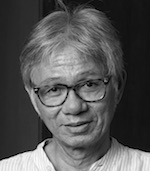
The murder of South Korean businessman Jee Ick Joo should rank as the most brazen crime in the Duterte regime.
Done, as state agents have found out, right inside Camp Crame, the national police headquaters, that's Murder in the Cathedral; it cannot be taken outside the context of President Duterte's war on drugs and his authoritarian inclinations. (READ: Murder in Camp Crame: A tangled tale of crime)
The agents, from the National Bureau of Investigation, said Jee had been picked up on the made-up accusation that he was involved in the drug trade, taken to Crame to maintain that pretext, and detained and strangled there. All that, according to the agents, happened on the same day – October 18, 2016. Jee's widow said she did not know she had paid ransom for an already dead husband.
Given the horribly agregious circumstances of his kidnapping, what chance, indeed, did Jee have? How could he have hoped to be kept alive? In fact, the agents said, he was reduced to ashes.
Rogue cops
Jee's case was pieced together by investigators only recently. Unlike in the run of innocent victims these days, Jee was not mistakenly accused or targeted, and definitely not accidentally killed. But one factor is common to his and certain other cases: rogue cops. Their breed has figured in not a few cases, but two would seem the most suspicious, if not obvious: the targets were killed in police custody.
One victim was Rolando Espinosa Sr, the provincial town mayor jailed on suspicion of dealing in drugs and whose son, himself arrested later, confessed to big-time dealing. The second case involves a father and son from a Manila slum colony – Renato and Jaypee Bertes, both users, the latter also a dealer, if a small-time one, of the locally popular shabu (metamphetamine).

A different though not altogether irrelevant category of crime is vigilante killing. Although today's vigilantes also target drug dealers and users, Duterte and his police chief, Director-General Ronald de la Rosa, are always particular and emphatic in disowning them every time the all-too-reasonable question is raised as to their role in the war on drugs. How often does Duterte have to say "they are not state-sponsored"?
Not even the pair of policemen in disguise, one wearing a woman's wig, caught motorcycling away in tandem from their victim, a young man lying lifeless on a street in Antipolo, are by any means official warriors; by Duterte's discriminating rules, they just had to have been operating on their own.
Police or vigilante killings, state-sponsored or not, there just have been too many of them – more than 7,000 as of January 22, 2017 – to escape suspicions that they have been carried out summarily, extra-judicially.
But why this brazenness, why this air of impunity, why this roguery? Maybe not state-sponsored, but Duterte-inspired.
It's hard to believe that the President does not realize the power of his words, how that power is increased with its every repetition – and how he loves to repeat! To his targets: "I will kill you!" And to his men: "I will protect you."
Those words necessarily carry a weight that corresponds to the 73% approval rating of his leadership, not to mention the force of his strongman personality and the influence inherent in his office.
Well known for punishing their own wrongdoers, including presidents, the South Koreans had interceded diplomatically in Jee's case. Well, they – and Mrs. Jee – now have General de la Rosa's apology, which he has given for himself and his president, who may have been too preoccupied to make the time to offer his apology himself. That's the ultimate least he could have done in exchange for a life taken so brutally for money by men the likes of whom he precisely vows to protect.– Rappler.com